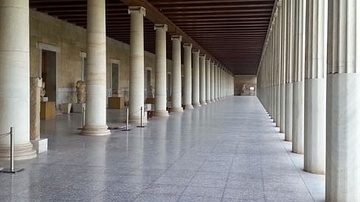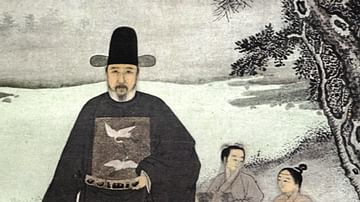Search Images
Browse Content (p. 1075)

Image
Roman Agora, Athens Greece
The Roman Agora, a modern-day replica of the ancient market place housing a museum highlighting local finds; Athens, Greece.

Image
The Seven Voyages of Zheng He
A map showing the route and destinations of the seven voyages of Zheng He between 1405 and 1433 CE, acting as an ambassador and explorer of the Chinese Ming Dynasty (1368 to 1644 CE).

Image
Map of the Ming Dynasty Territory
A map indicating the territory controlled by the Ming Dynasty (1368 to 1644 CE) in the late 16th century CE.

Image
The Hongwu Emperor
The Hongwu Emperor, the first emperor of the Ming Dynasty (1368 to 1644 CE) who reigned from 1368 to 1398 CE. 14th century CE painted silk hanging. (National Palace Museum, Taipei)

Image
First Council of Nicaea
Icon from the Mégalo Metéoron Monastery in Greece, representing the First Ecumenical Council of Nicaea in 325 CE, with the condemned Arius in the bottom of the icon.

Image
Ming Civil Servant Jiang Shunfu
A portrait of Jiang Shunfu (1453-1504 CE), a civil servant of the first rank during the Ming Dynasty of China (1368-1644 CE). His rank is indicated by the two cranes rank badge on the front of his robes. (Nanjing Museum, China)

Image
The Great Sphinx and Pyramids of Giza
The Great Sphinx and Pyramids of Giza, Egypt; dated to the Old Kingdom period c. 2613-2181 BCE.

Image
Temple of Heaven, Forbidden City
A detail of the roof of the Hall of Prayer for Good Harvests, part of the Temple of Heaven in the Forbidden City, Beijing. The temple and the Forbidden City were first built in the reign of Yongle Emperor of the Ming Dynasty (r. 1403-1424...

Image
Relief of Chandragupta Maurya &
A relief of Indian emperor Chandragupta Maurya and the sage Bhadrabahu. Stone carving from Chandragupta Basti temple at Shravanabelagola, Karnataka. Possibly 12th century CE.

Image
The Temple of Aphaia, Aegina, Greece
Temple of the local fertility goddess Aphaia, Aegina, Greece, c. 500 BCE.